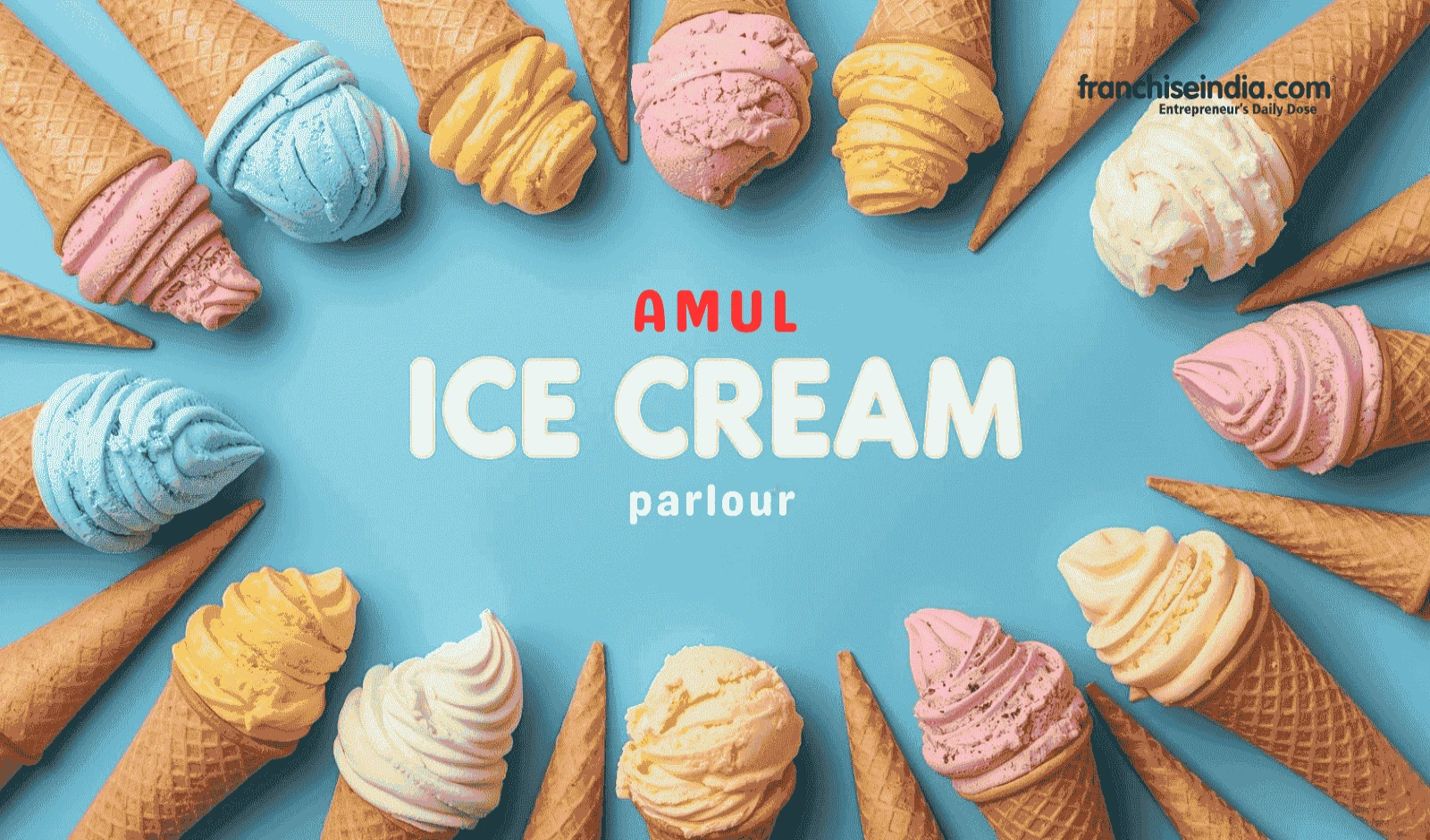
Without an ice cream, the Indian summer is incomplete. From the common street seller to the extravagant, sophisticated ice cream parlour, India's frozen dessert is as diverse as India itself. Amul is a brand that stands out as a genuine symbol in this market that offers a variety of products while maintaining the quality. But how is Amul essentially different from others? How do they stack up against the evergreen competition? Read this article to the end to know about their business model, pricing, experience, and how it stands out from the rest.
Also read: Amul offers business model for entrepreneurs to earn Rs 5-10L monthly
The Core Business Model: Cooperative vs. Corporate
 (1).png)
At the heart of the matter lies a fundamental divergence in business structure.
Amul
Structure:
Amul does not operate as a typical private company but as a dairy cooperative, a third-tiered system that empowers millions of dairy farmers. This structure is often referred to as the "Anand Pattern."
Purpose:
Their unique framework means that their every product, from ice cream to packaged food, serves a purpose. Profits are directed back to dairy farmers that produce and serve as an economic engine for rural companies.
Supply Chain:
This model gives a vertically integrated supply chain to Amul for strict control from their very source. Amul' milk collection network serves as a robust foundation that private companies struggle to replicate.
Other Ice Cream Shops
Structure:
Most other ice cream companies operate under private or corporate entities.
Purpose:
Their primary goal is to generate profit for the owner.
Supply Chain:
They source their ingredients or raw materials from third-party suppliers; their cost and profit margins are managed differently from a corporation.
Consistency vs. Specialization: Which Path to Take
Amul’s product philosophy is focused on reliability and dependability. consistency. With the motto "Real milk, real ice cream", the brand was launched in 1996. It positioned itself as a healthy alternative, replacing frozen desserts made with a vegetable oil.
It has an extensive selection of over 200 products, including different flavors of ice cream like vanilla, chocolate, strawberry, and butterscotch, along with the Indian favorites kulfi and kesar pista.
Other ice cream shops, however, don't aim to be a one-size-fits-all solution. Instead, they focus on carving out a specific niche.
Natural and handcrafted:
Companies such as Naturals have based their whole brand on using natural ingredients and fresh fruits to create distinctive tastes like Sitaphal and Tender Coconut. Customers who appreciate authenticity and clean labels are their target audience, who find these appealing.
Innovative:
Shops that provide a cinematic experience, including Cream Stone. The ice cream is created in front of the customer, blended with the toppings of their preference. This transforms straightforward shopping into an unforgettable experience.
Gourmet and International:
High-end ingredients, sophisticated taste combinations, and a premium price tag make brands like Gelato Vinto appealing. They often import ingredients from around the world to guarantee a genuine flavor profile.
Also read: Why is Amul Franchise Profitable
Pricing and Accessibility
The most obvious difference between consumers is pricing.
Amul
- Amul is able to maintain a very competitive price strategy, making it cost-effective. They use their business model and scale it.
- Many people enjoy Amul ice cream on a regular basis. Its strong value offer is a major factor in its market supremacy.
- The brand operates on thin margins but massive volumes.
Other ice-cream shops
- The majority of other ice cream shops charge more.
- This is a conscious decision that aligns with their plan and product strategy. The higher cost of ingredients, equipment, etc., are all factors in the price margin.
- This higher price creates a clear market segmentation, positioning these brands in the premium, gourmet, and experiential niches.
The Store Experience: Functional vs. Experiential
 (1) (1).png)
Entering into the Amul parlour, you will find a tidy, practical, and functional area that has been planned for efficiency. The primary purpose is transaction. After approaching the counter, you place your order, make the payment, and receive your ice cream. Based on the assurance of prompt, dependable, and sanitary service, the experience is constant and uncomplicated.
This concept has been flipped by the increasing number of ice cream shops. The experience is just as important as the product. These stores are intended to be destinations—places to hang out, relax, etc. They invest heavily in creating a specific ambience that matches their brand identity.
Bright and Cheerful:
Many parlours use bright colours and playful décor to attract families and younger crowds.
Cosy and Inviting:
Some adopt a more rustic or café-like feel, encouraging customers to linger and enjoy their dessert.
Modern and Trendy:
High-end shops often feature minimalist design, premium materials, and chic seating, positioning themselves as a fashionable place to be seen.
These shops often offer a more personalised service, with staff who are trained from customising flavours to choosing toppings. The goal is not just to sell ice cream but to sell a memory.
Also read: Amul reveals its expansion plans
Distribution and Reach
Amul
- Amul has developed one of the largest chains in the world because of its cooperative strategies. Its distribution network is extensive, from busy urban centres to the remotest and most isolated rural areas.
- An Amul parlour restocking Amul products is rarely more than a short walk. One significant competitive advantage is the widespread availability.
- One of the main reasons for a consumer’s decision to choose Amul is its easy availability and accessibility.
Other ice-cream shops
- Other ice cream stores tend to be more localised or focused. An organic brand that serves a particular neighbourhood may only have a few stores in a single city.
- They have a nationwide presence; even bigger chains could not be as well established as Amul is.
- The variation in reach demonstrates the different approaches used by the two brands
Also read: Why is Amul Franchise Profitable
What Makes It Stand Out From the Rest
Amul's distinctiveness is not defined by one single factor. Its unique fusion of business model, social mission, and brand marketing strategy really makes it stand out from the rest.
First of all, it stands out as a brand with a purpose thanks to its cooperative approach. Amul isn’t just selling ice cream; it is promising and giving commitment to millions of dairy farmers. The idea that every purchase helps rural areas become more economically empowered strikes a strong chord with Indian consumers. The brand has a moral and ethical component that its corporate rivals cannot match thanks to its social base.
Second, its commitment to value for money and widespread availability. Amul’s consistent commitment to offering high-quality, reasonably priced products has reinforced its status as a national favourite, where other companies are still fighting for it. It has transformed ice cream from a luxury for a select few to an affordable treat for everyone.
Finally, its brand identity is a strong source of trust and nostalgia. The Amul girl is more than just a symbol; she is a cultural icon that has developed with Indian generations. This deep-rooted emotional connection creates a level of reputation for reliable quality.
Conclusion: A Tale of Two Philosophies
The ice cream industry in India is a microcosm of the economic development of the nation. The conflict between Amul and other business brands is not just a battle for market share; it is a clash of two very different corporate philosophies. The rest of the industry, on the other hand, is thriving and dynamic. They compete on the basis of specialisation, distinctiveness, and experience quality. Their success lies in their ability to innovate and appeal to an increasingly discerning consumer base that values uniqueness and personalisation.
The Indian ice cream industry is a reflection of the nation's economic growth, with rival brands like Amul vying for market share. The industry's diverse offerings cater to discerning consumers, offering a variety of frozen treats.
You might also like: Franchise vs Starting from Scratch: A Clear Comparison

